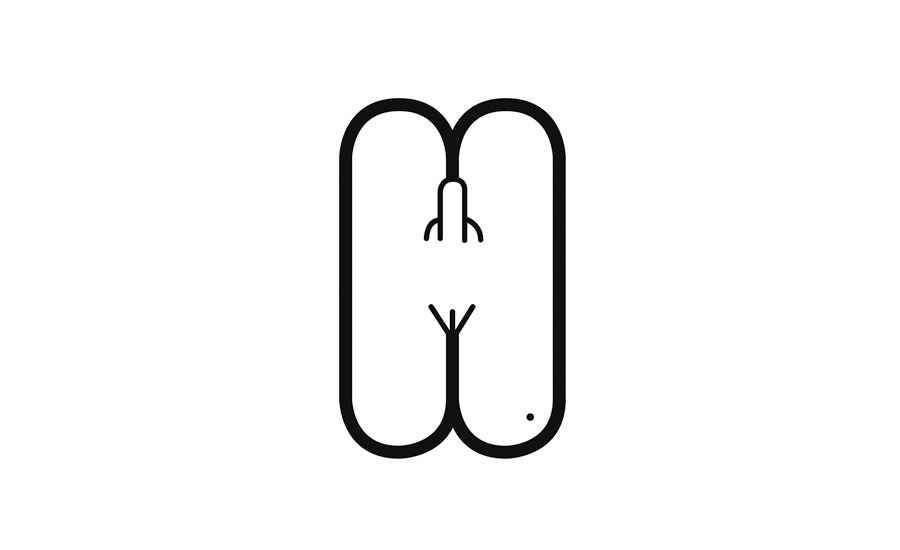[youtube=http://www.youtube.com/watch?v=195DIZY-C3Y&hl=en_US&fs=1&]
The work of Geraldine Brezca, Quentin Tarantino’s clapperboard operator.
Via ck.ck.
Brooklyn boy Alex Merto has designed this magnificent font. See if you can guess where he gets his inspiration. 


Look. I wrote my name in it. It's naughty. You can see them all here on his website. He's done some really nice stuff.
You can see them all here on his website. He's done some really nice stuff.
Bob always finds the best stuff, which he usually puts on his excellent website, Original-Linkage. You should visit the site. He collates the finest creative work from around the world. Not all agencies though, sometimes more unlikely types. Here's his post on Jeff Bridges:
 I know we've already had a glut of photography, however having just watched Crazy Heart, I thought you may be interested to snoop through some of Jeff Bridge's photographs, most of which have been taken on a 35mm WideLux panoramic camera with a 28mm lens.The format alone is interesting, but if you're into your film, then you'll appreciate the content too.
I know we've already had a glut of photography, however having just watched Crazy Heart, I thought you may be interested to snoop through some of Jeff Bridge's photographs, most of which have been taken on a 35mm WideLux panoramic camera with a 28mm lens.The format alone is interesting, but if you're into your film, then you'll appreciate the content too.
[youtube=http://www.youtube.com/watch?v=3w4B7QxL_n4&hl=en_US&fs=1&]
Okay Go - This Too Shall Pass
[youtube=http://www.youtube.com/watch?v=qybUFnY7Y8w&hl=en_US&fs=1&]
Synthwire says: Chris Supranowitz is a researcher at The Insitute of Optics at the University of Rochester. Along with a number of other spectacular studies (such as quantum optics, trapping of atoms, dark states and entanglement), Chris has decided to look at the relatively boring grooves of a vinyl record using the institute’s electron microscope. Well, not boring for me.
From what I read, it’s not just a simple matter of sticking a record under a fancy microscope, as there is a lot of preparation (such as gold-sputtering the surface) and post-processing to be done. Having said that, the results are very cool:
Here is a shot of a number of record grooves (the dark bits are the top of the grooves, i.e. the uncut vinyl):
Here’s the grooves closer up – the little bumps are dust on the record:
And here’s a single groove even closer still, magnified 1000 times:
Chris decided to take the whole electron microscope image one step further, and created a blue/red 3-dimensional image of the record groove! So, if you have a pair of 3D glasses (sorry, the ones you got from watching Avatar won’t work – you need red on the left, blue on the right), throw them on and take a look at this amazing picture:
Maybe these vinyl grooves are only beautiful to an audio geek like me, but I think that these images are truly spectacular. I wonder what we’d see if it was magnified further still?
Antonia sent me this piece on depression from The New York Times. Absolutely fascinating. It's by Wired contributing editor Jonah Lehrer, who has just written a book called How We Decide. I've only put the first bit on this page, so you'll have to click HERE to see the full article.
(NB - if you're reading this on FaceBook, you'll probably need to go to the original post on my blog to make the links work)
The Victorians had many names for depression, and Charles Darwin used them all. There were his “fits” brought on by “excitements,” “flurries” leading to an “uncomfortable palpitation of the heart” and “air fatigues” that triggered his “head symptoms.” In one particularly pitiful letter, written to a specialist in “psychological medicine,” he confessed to “extreme spasmodic daily and nightly flatulence” and “hysterical crying” whenever Emma, his devoted wife, left him alone.
While there has been endless speculation about Darwin’s mysterious ailment — his symptoms have been attributed to everything from lactose intolerance to Chagas disease — Darwin himself was most troubled by his recurring mental problems. His depression left him “not able to do anything one day out of three,” choking on his “bitter mortification.” He despaired of the weakness of mind that ran in his family. “The ‘race is for the strong,’ ” Darwin wrote. “I shall probably do little more but be content to admire the strides others made in Science.”
Darwin, of course, was wrong; his recurring fits didn’t prevent him from succeeding in science. Instead, the pain may actually have accelerated the pace of his research, allowing him to withdraw from the world and concentrate entirely on his work. His letters are filled with references to the salvation of study, which allowed him to temporarily escape his gloomy moods. “Work is the only thing which makes life endurable to me,” Darwin wrote and later remarked that it was his “sole enjoyment in life.”
For Darwin, depression was a clarifying force, focusing the mind on its most essential problems. In his autobiography, he speculated on the purpose of such misery; his evolutionary theory was shadowed by his own life story. “Pain or suffering of any kind,” he wrote, “if long continued, causes depression and lessens the power of action, yet it is well adapted to make a creature guard itself against any great or sudden evil.” And so sorrow was explained away, because pleasure was not enough. Sometimes, Darwin wrote, it is the sadness that informs as it “leads an animal to pursue that course of action which is most beneficial.” The darkness was a kind of light.
The mystery of depression is not that it exists — the mind, like the flesh, is prone to malfunction. Instead, the paradox of depression has long been its prevalence. While most mental illnesses are extremely rare — schizophrenia, for example, is seen in less than 1 percent of the population — depression is everywhere, as inescapable as the common cold. Every year, approximately 7 percent of us will be afflicted to some degree by the awful mental state that William Styron described as a “gray drizzle of horror . . . a storm of murk.” Obsessed with our pain, we will retreat from everything. We will stop eating, unless we start eating too much. Sex will lose its appeal; sleep will become a frustrating pursuit. We will always be tired, even though we will do less and less. We will think a lot about death.
The persistence of this affliction — and the fact that it seemed to be heritable — posed a serious challenge to Darwin’s new evolutionary theory. If depression was a disorder, then evolution had made a tragic mistake, allowing an illness that impedes reproduction — it leads people to stop having sex and consider suicide — to spread throughout the population. For some unknown reason, the modern human mind is tilted toward sadness and, as we’ve now come to think, needs drugs to rescue itself.
The alternative, of course, is that depression has a secret purpose and our medical interventions are making a bad situation even worse. Like a fever that helps the immune system fight off infection — increased body temperature sends white blood cells into overdrive — depression might be an unpleasant yet adaptive response to affliction. Maybe Darwin was right. We suffer — we suffer terribly — but we don’t suffer in vain.
(THERE'S MORE TO THIS PIECE, SO READ THE REST OF IT HERE)
[youtube=http://www.youtube.com/watch?v=-kXgRgiZ-fw&hl=en_US&fs=1&] By Charlie Hope.
NB - If you're on Stalkbook, you won't see diddly, so go to my blog, which is at www.dysonology.com/blog.html








The following swiped in its entirety from the excellent Prancehall blog: 
Colonel Ryszard Kuklinski with Texas A&M cadets
Invented by Ryszard "Crunk King" Kuklinski (the grandson of an infamous Polish Cold War spy of the same name), Crunkczar, which sounds a bit like Polish donk, is a terrifying new genre that makes ravers lose control of their bodies. The drug of choice is a cocktail of carfentanyl, a downer that's approximately 10,000 times more potent than morphine, and Dexedrine, a powerful amphetamine. (Young fans opt for something slightly less harmful: a mixture of Red Bull and sherbert, referred to as "crunk gunk".)
Some people will break both their arms and continue dancing all night as if nothing has happened. Also, numerous cases have been reported of people dancing so fast that their heart gives in and they drop dead on the dancefloor.
Download: Lil Wayne, "A Milli (Ryszard Kuklinski remix)
At one rave at the end of last year, when the above song was pitched up to +16, three people dropped dead before the track had finished.
Full story over on guardian.co.uk/music.
(swiping ends - NB, if you're reading this on Stalkbook, you'll need to go to my blog to be able to hear the music)
(it's a work in progress, but...)
ps - if you're on Stalkbook, you won't be able to see this, so go to http://www.dysonology.com/blog.html instead.
The man is fascinating and well worth discovering (here's his Wiki which has some good links). His dictionary alone would qualify him for props, but even without that, his essays for The Idler, The Rambler and the Gentleman's Magazine, his literary criticism, his personal life (pride, physical tics, beautiful but ultimately tragic love with his wife, moral outrage at most things, disputes with bailiffs - and milkmen, towering intellect, abolitionist activities and so on) make him one of my favourite characters and a definite shoe-in for the old "who would you have for dinner" question.
I'm no expert and really can't do him justice. Talking about him at length is like trying to explain climate change without research - you just come across as a twit who doesn't know that much.
That said, it's interesting to note that 250 years ago he was writing more cohesively and with more originality about human nature and our kind's foibles than pretty much any modern journo you care to mention. A lot of the knee-jerk moralising and navel-gazing you see in todays newspaper columns and magazines just comes across as pale imitation.
A few examples? I'd be happy to (though I usually have to read them a few times to get them!). From his essays:
The cure for the greatest part of human miseries is not radical, but palliative.
Men more frequently require to be reminded than informed.
So willing is every man to flatter himself, that the difference between approving laws, and obeying them, is frequently forgotten; he that acknowledges the obligations of morality and pleases his vanity with enforcing them to others, concludes himself zealous in the cause of virtue.
Merit rather enforces respect than attracts fondness.
Ease, a neutral state between pain and pleasure...if it is not rising into pleasure will be falling towards pain.
Almost every man has some real or imaginary connection with a celebrated character.
All censure of a man's self is oblique praise. It is in order to show how much he can spare. It has all the invidiousness of self-praise, and all the reproach of falsehood.
Such is our desire of abstraction from ourselves, that very few are satisfied with the quantity of stupefaction which the needs of the body force upon the mind. Alexander himself added intemperance to sleep, and solaced with the fumes of wine the sovereignty of the world. And almost every man has some art, by which he steals his thought away from his present state.
I would injure no man, and should provoke no resentment. I would relieve every distress, and should enjoy the benedictions of gratitude. I would choose my friends among the wise and my wife among the virtuous, and therefore should be in no danger from treachery or unkindness. My children should by my care be learned and pious, and would repay to my age what their childhood had received.
***
Interesting ain't it? Some things never change. We might think we're doing or thinking things for the first time, but...
(ps, if you're on Facebook, you won't be able to see the links and stuff, so click to see the original blog post)
[youtube=http://www.youtube.com/watch?v=cFAGUAl8lxE&color1=0xb1b1b1&color2=0xcfcfcf&hl=en_US&feature=player_embedded&fs=1]
The company that has been secretly supplying rifle sights to the US military inscribed with coded references to the Bible, as revealed by The First Post this week, has agreed to halt the practice. Trijicon, the Michigan-based company founded by a devout Christian whose idea the inscriptions were, has bowed to pressure from the Pentagon and from New Zealand military leaders.
Like the US Marines and the US Army, the New Zealand army also has troops in Afghanistan and had no idea the rifle sights carried such coded inscriptions as 'JN8:12', which referred to the New Testament Book of John, Chapter 8, verse 12: "Then spake Jesus again unto them, saying, I am the light of the world: he that followeth me shall not walk in darkness, but shall have the light of life." Read the whole thing here.
Via.
[youtube=http://www.youtube.com/watch?v=6UCtOZzPYg8&color1=0xb1b1b1&color2=0xcfcfcf&hl=en_US&feature=player_embedded&fs=1]
Well...if it keeps them off the streets.
Utterly bizarre.
[youtube=http://www.youtube.com/watch?v=EyVenbukMik&color1=0xb1b1b1&color2=0xcfcfcf&hl=en_US&feature=player_embedded&fs=1]
Via EIT.
(if you're in FB, click here instead as you won't be able to see diddly)
Great new blog - Hipster Puppies. I shall be submitting my own photos forthwith.![arlo says the bullshit “no taping” policy at bb king’s blues club is a “third reich thought police tactic” and that it’s a tragedy this ween show will go undocumented[photo via kyle f]](http://24.media.tumblr.com/tumblr_kxhqmzc5pC1qb0fx9o1_500.jpg)
Arlo says the bullshit 'no taping' policy at BB King’s Blues Club is a “third reich thought police tactic” and that it’s a tragedy this ween show will go undocumented

It may have been the wine talking, but I doubt it. Hammond Eggs, in one of his late night voyages of Wiki-discovery, stumbled on this delicious list: British Words Not Widely Used in the American Language.
There are some corkers. Some more obvious than others. Our Heath Robinson is their Rube Goldberg. We say arse rather than backside, buttocks or anus; plus there's always baps and bangers, blagging and bodging. But what about cagoule or breve (as in the musical note - for some reason Americans don't have quavers either)? Higgledy-piggledy? It's all at sixes and sevens.
The list is chock-full of words that, never mind the Americans, need to be bought back into limey-land and dropped into conversation once again. Little idiosyncrasies that give our speech texture and make English unique from the other commonwealth tongues.
So celebrate next time you call someone a Kev or a Joey; relish the way a squidgy, manky lurgy rolls off your tongue; and watch out for mingers and nonces. English rocks - and not just the rhyming slang. Crikey! Let's scarper before the rozzers get here!














